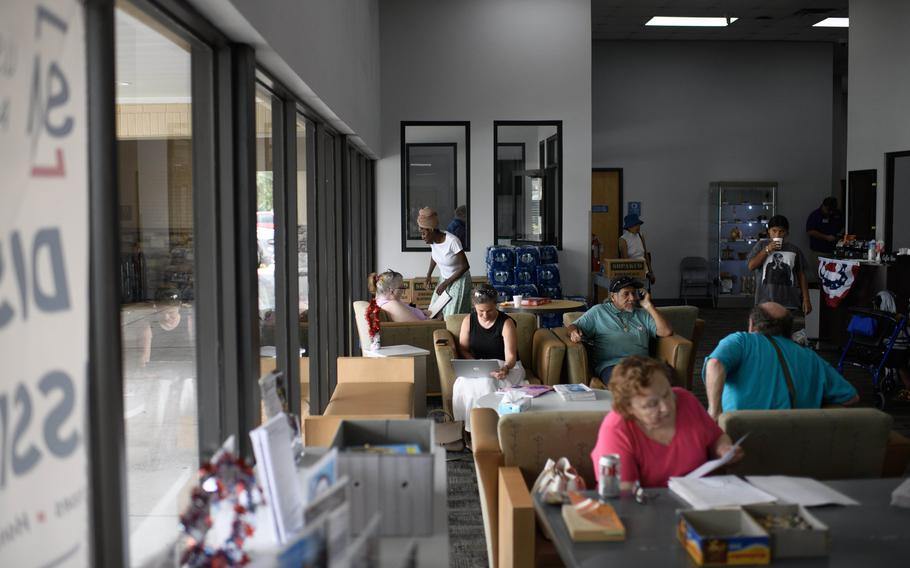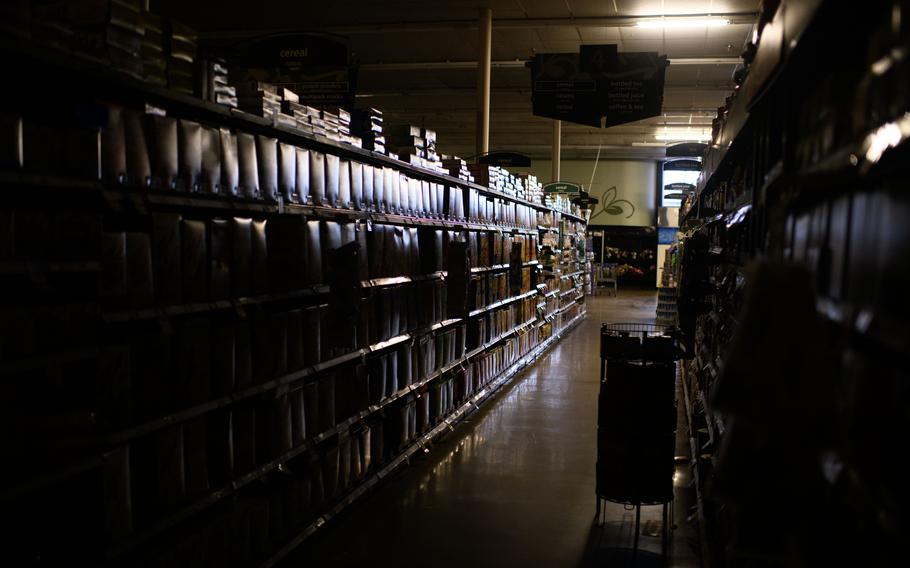
Residents cool off and charge electronics at a community center after Hurricane Beryl in Houston on July 10. (Mark Felix/Bloomberg)
Days after Hurricane Beryl crashed through the city, Houston is still grappling with the aftershocks.
Large swaths of America’s fourth-largest city are still without power, shutting stores and snarling traffic at non-functioning lights. Gas stations are either closed or swamped with long lines of people desperate to fuel their cars and home generators.
More than 1 million homes and businesses face another day sweltering without air conditioning as the US National Weather Service warns of heat-related illness.
Rimsha Aslam, 28, moved to the city just three months ago from Thailand. She and her father had to leave the apartment they shared after it was flooded, finding refuge in a neighborhood YMCA that’s been transformed into a cooling center.
“There are no restaurants open, all the shops are closed — everybody is still struggling,” Aslam said of her neighborhood in west Houston. “I’m totally new here: This is my first experience of a storm in Houston,” she said, adding “it’s not like this” in Thailand. It’s a humbling feeling for a city that markets itself as the “Energy Capital of the World.”
Roughly 1.3 million homes and businesses were still without power in Texas on Thursday morning, according to PowerOutage.us. The majority of the problems are concentrated in Houston, with the area’s main utility, CenterPoint Energy Inc., accounting for more than 80% of those outages.
While that’s down from the peak - at the worst the CenterPoint outages topped 2.2 million — it’s still a major hardship for Texans baking under intense conditions. The region’s heat index values - a measure of how hot it feels when humidity is factored in - are forecast to be as high as 106F.
Some 72 hours after the storm, Houston is divided between those who have power and those who don’t. For the lucky ones, life is getting closer to normal, but for everyone else, it’s a brutal waiting game.
CenterPoint said it expects to have an additional 400,000 customers restored by the end of the day on Friday and a further 350,000 customers restored by the end of the day on Sunday.
Still, that means that nearly a week after the storm, tens of thousands will remain under blackouts.

A Kroger grocery store without power in Houston on July 9. (Mark Felix/Bloomberg)
‘Tensions Rise’
Bill Hudgens, 80, bought a generator for his son at a Lowe’s Cos Inc. store near Houston’s Energy Corridor, a few miles from US headquarters of BP Plc and Shell Plc. The inside of “his house is now approaching the high 80s,” he said, waiting for store assistants to load the 6500-watt Generac onto his truck. “His mother-in-law is 90 years old, and no one’s happy. Tensions rise when the temperature rises.”
The continued outages are provoking ire from residents and some officials.
“I hope they’re doing their best - but so far it’s not enough,” Mathurin Oulai, 63, said of the utility’s efforts. Oulai is concerned about how he’ll secure enough gasoline and supplies to last through the next few days.
“To find gas you have to drive 30 minutes, 40 minutes,” he said. “Everything is closed, and I’m a disabled man. I tried to contact social security, but it’s closed. I drove over there, and they just let me know all the social security offices are closed.”
Not all areas are being hit the same. So far, the power has been restored for about half of CenterPoint customers that were impacted by the storm. Gasoline is available and grocery stores are open in large parts of the sprawling city.
Beryl struck the city on Monday as a Category 1 hurricane. AccuWeather Inc. estimated the storm’s cost in the US, counting both damages and economic losses, could reach $28 billion to $32 billion.
Drew Dickert from north-west Houston lost power for 30 hours, but as soon as it returned his thoughts turned to a friend with severe asthma who relies on an oxygen machine.
“He’s got these generators, but one of them went down,” said the 65-year-old geologist. “I picked up some gas and am getting some hardware to keep him going.”
The utility’s “inability to restore power more quickly is creating a public health crisis,” wrote Representative Sylvia Garcia, a Democrat from Texas, in a letter to CenterPoint’s chief executive officer that was posted on her X account.
Texas Governor Greg Abbott said in an interview with Bloomberg News that the outages are a “horrible issue for our fellow Texans” and that he will direct the state’s Public Utility Commission to study why blackouts have happened repeatedly in Houston. Less than two months ago strong winds known as a “derecho” left thousands without power, some for days.
During a Houston city council meeting on Wednesday, Councilwoman Carolyn Evans-Shabazz expressed particular concern about the fate of residents of assisted-living facilities lacking backup generators.
“These storms are getting worse, and coming more frequently and we are defenseless,” Evans-Shabazz said.